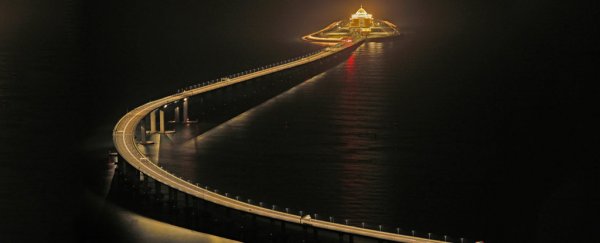After nine years of construction and controversy, China is set to officially unveil the world's longest sea bridge on Tuesday at a ceremony in Hong Kong.
At more than 34 miles (54 kilometres) long, the Hong Kong-Zhuhai-Macau Bridge is part of a master plan to create a global science and technology hub by connecting two Chinese territories, Hong Kong and Macau (the world's largest gambling center), to nine nearby cities.
With an economic output of US$1.5 trillion, the new mega-region - known as the Greater Bay Area - is positioned to rival Silicon Valley. The plan also includes the construction of an US$11 billion bullet train, which opened in September.
The bridge is expected to open to traffic on Wednesday, though only certain vehicles - shuttles, freight cars, and private cars with permits - are allowed to cross. Pedestrians and bicyclists are prohibited.
While some have criticized the structure as a waste of taxpayer dollars, others tout its ability to connect up to 70 million people in the region. Take a look at its remarkable design below.
The US$20 billion structure is 20 times as long as the Golden Gate Bridge.
 (Vincent Yu/AP)
(Vincent Yu/AP)
The title of world's largest sea bridge previously belonged to the Jiaozhou Bay Bridge, which stretches 26.3 miles (42 kilometres).
The Hong Kong-Zhuhai-Macau Bridge is designed to last for more than a century, with the capacity to withstand major storms and earthquakes.
 (Bobby Yip/Reuters)
(Bobby Yip/Reuters)
The structure should hold up in the face of 211 miles per hour (339 kilometres per hour) winds. That claim was put to the test in September, when Typhoon Mangkhut swept through Hong Kong, destroying roofs, shattering windows, and toppling trees.
The bridge is made of 420,000 tons of steel - enough to build 60 Eiffel Towers.
The bridge's towers were inspired by three elements: Chinese knots, the Chinese white dolphin, and the mast of a boat. The bridge's curves are designed to resemble a snake.
 (Bobby Yip/Reuters)
(Bobby Yip/Reuters)
A 4-mile (6.4 kilometre) underwater tunnel connects two artificial islands, which help support the structure. The tunnel was built below the water to prevent the disruption of shipping lanes. The Greater Bay Area is one of the busiest shipping areas in the world, with about 4,000 vessels passing through each day.
Construction kicked off in 2009 and was set to finish in 2016 but was delayed because of budget and safety concerns.
Nine workers have died and more than 200 have been injured over the course of construction. Nineteen workers have also been charged with faking concrete-test reports.
Some have questioned the bridge's stability after photos appeared to show its wave-absorbing concrete blocks drifting off into the water. Authorities said the structure was intended to be partially submerged, though renderings tell a different story.
 (Kin Cheung/AP)
(Kin Cheung/AP)
Environmentalists fear that construction has threatened the livelihood of the Chinese white dolphin. The area where the Pearl River meets the South China Sea was once a sanctuary for the species, whose population has declined since construction began.
Officials expect the bridge to cut commute times in half. About 40,000 vehicles are expected to use the bridge on any given day, with shuttle buses running every 10 minutes.
The bridge includes a designated merge point, where cars can switch to the appropriate side of the road. People in Hong Kong and Macau drive on the left side of the road, while those in mainland China drive on the right.
To cross the bridge, pedestrians and drivers without a permit will have to purchase a shuttle ticket, costing US$8 to US$10.
 (Vincent Yu/AP)
(Vincent Yu/AP)
Chinese President Xi Jinping is expected to attend the bridge's official unveiling on Tuesday. Experts say Hong Kong should expect an influx of tourists from mainland China.
This article was originally published by Business Insider.
More from Business Insider:
